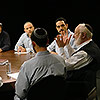Audio Version Of The Blog – 5/10/24
Listen to an Audio Version of the Blog
Download:MP3Audio

Listen to an Audio Version of the Blog
Download:MP3Audio
 The mind given to man must be used correctly in order to extract from all Kabbalistic articles principles of bestowal and faith above reason and build one’s intention accordingly.
The mind given to man must be used correctly in order to extract from all Kabbalistic articles principles of bestowal and faith above reason and build one’s intention accordingly.
Above reason does not mean I throw away my mind altogether. Above reason means to rise above the egoistic understanding I used to have and transition to a higher level.
Faith above reason is the ability to relate to the whole reality not from the egoistic point of view, but from the desire to bestow.
[328334]
From the 1st part of the Daily Kabbalah Lesson 4/22/24, Writings of Baal HaSulam “Concerning the Staff and the Serpent”
Related Material:
The Mind Is A Servant Of The Desires
Faith Above Reason
What Is Faith Above Reason?
 Question: What does it mean to treat what the Creator has sent me correctly in the same way He treats it?
Question: What does it mean to treat what the Creator has sent me correctly in the same way He treats it?
Answer: The Creator always gives us a step forward toward Him and helps us move forward.
Therefore, we must try to use each state, realize that it comes to us from the Creator, not leave it without any reaction, and take another step forward.
Question: How do you begin to clothe yourself in the Creator and see reality as He sees it?
Answer: We need to get to this gradually, and then we will see how we are progressing. In the meantime, we need to convince ourselves all the time that we should ask the Creator to bring us closer to Him.
[327719]
From the Daily Kabbalah Lesson 4/3/24, Writings of Rabash “The Meaning of Exile”
Related Material:
Go Forward, Do Not Linger!
Start-Stop Movement
Always Ready To Take A Step Forward
Dear Michael Laitman,
Parenting is one of my greatest concerns today.
I found this quote from Korney Chukovsky: “Hearing a fairy tale, a child usually sides with the kind, courageous, or unfairly treated. Our whole task is to awaken, foster, and strengthen, in the pliable mind of a child, this precious ability to empathize, sympathize, and share other’s joy, without which a human is not really a human.
In your opinion, which books should be available to a child? A battle of good and evil so the child can choose a good force or books that describe this world as completely good without any evil?
Answer: At first, completely kind books for elementary school children if I may say so. And then in a more natural way books where evil is present on a par with good: Good wins, evil retreats, and so on until a child matures and begins to read books and novels where evil prevails.
Comment: Such is a person’s preparation.
My Response: To bring him out of fairy tales and introduce him to real life.
Question: And in real life where evil wins?
Answer: Of course. So a child must learn not to oppose evil because he will only bring problems on himself. He must learn that evil wins, but he should remain on the sidelines; at no point does he engage in a fight against evil.
Comment: I understand this progression. At first, he is just a small, gentle child; we don’t want to scare him. The first stage is clear. Second, gradually evil appears, yet good still wins. This too is clear, so he would be on the side of good. Then you made a drastic turnaround, you said our world is all evil.
My Response: Meaning, we explain to a child that although there is good and evil in our world, we need to dodge evil.
Question: Is this what we explain to the child?
Answer: Yes, to a child, but only at the third stage.
Question: So you don’t accept evil after all? One should avoid it, as you said. This is the third stage.
When does he understand that our world is built on evil?
Answer: He will understand this when he is in the third stage. He will turn away, step back, and distance himself from it. Then comes quite an interesting stage when he gets involved with evil and uses it for his own selfish needs, career advancement and so on.
Question: So our little protagonist, who started out so pure, suddenly climbs the career ladder, stepping on others and so on?
Answer: Yes
Question: And then the fifth stage, should he understand he is like that?
Answer: We have not yet reached this in our world, so we have no clear examples. That is why I don’t want to talk about it.
Question: But should he at least come to the conclusion that this is bad?
Answer: He must come to the conclusion that he cannot live in such a world, that indeed in our world of egoism everything is distorted. So he has no choice but to simply distance himself from this world as much as possible, because he still has to exist, provide for his children, and so on. But in general it is a problem.
Comment: It’s a problem to isolate yourself from this world. Especially now when social media is everywhere.
My Response: Yes, but if he knows this basic principle, he distances himself from the world.
Question: The principle that it’s all a lie, that everything he’s being fed is paid for and that he needs to distance himself?
Answer: Right.
Question: Then just tell us the right way to distance oneself. What should one surround oneself with? No wonder, Alyona asks: “What to make available to a child?” And now I’m asking you about adults: what should one surround oneself with, how can one distance oneself from the world?
Answer: Surround yourself with self-care. Find something you love besides work or home. I remember I had a neighbor who was into woodwork. That’s all. That was his activity. He searched for all sorts of wood, logs, and everything else and then worked on them. Made birdhouses, all that kind of stuff. He liked it.
Question: So you are gradually, gently bringing us to such a way of distancing yourself from the world by taking up a hobby? Collecting soldiers, I don’t know how to process woodworking?
Answer: It doesn’t matter, yes.
Question: And then? Still, how do we take care of the soul?
Answer: Well, I’m talking about ordinary people.
Comment: But let’s take it a step further.
My Response: This will bring him closer to his soul.
Question: So we have now gone from a small child to an adult. Where should a person come to as a result, having gone all this way, in the end?
Answer: To the fact the simplest handiwork softens the soul. In general, he will be satisfied with his existence.
Question: But will this question vex him, after all, such a small question about his soul?
Answer: Maybe, yes, and maybe that will be enough for the level of development of his soul.
[325128]
From KabTV’s “News with Dr. Michael Laitman” 12/21/23
Related Material:
Will The Fairy Tale Of Our Life Have A Good Ending?
Harmful Children’s Fairy Tales
How Can We Teach Children Kindness?
 Question: Your teacher Rabash wrote an article, “Make yourself a Rav and buy yourself a friend.” For the title, he took a saying from the Mishnah, a book by our sages about 2,000 years ago.
Question: Your teacher Rabash wrote an article, “Make yourself a Rav and buy yourself a friend.” For the title, he took a saying from the Mishnah, a book by our sages about 2,000 years ago.
It gives the following advice: to acquire the property of bestowal (the property of the Creator), three conditions must be met. The first is to make yourself a Rav (Rav comes from the word “great,” teacher). The second is to buy yourself a friend. The third is to judge every person to the scale of merit.
I would like you to explain all three actions. Why do we need to fulfill them?
Answer: The point is that although we are connected with the Creator, we do not have mutual feelings with Him. Therefore, we cannot be with Him directly in such a relationship as with a friend, a teacher, or other people.
A person wishing to connect with the Creator must first acquire a friend. People who come to study Kabbalah and whose goal is to reveal the Creator must be in a group of like-minded individuals and develop mutual connection among themselves. Moreover, this connection should be higher than anything else for them. That is the first condition for a person striving to attain the upper world.
Question: But why specifically “buy” a friend? What does this mean?
Answer: It means using all opportunities to bring a person like you who is striving for the same goal closer to you, and being able to unite with them like with no one else. After all, in this connection, you are considered as one whole.
[328138]
From KabTV’s “Practical Kabbalah” 4/11/24
Related Material:
“Buy Yourself A Friend”
Trust Your Friends, Not Yourself
Give Love
 Question: It is said: first, make yourself a Rav. What does that mean?
Question: It is said: first, make yourself a Rav. What does that mean?
Answer: Rav, from the word “great,” a teacher. “Make” means approaching him with gifts, participation, friendliness, etc.
Comment: I remember you explained that if we talk about the Creator, “make” means I must accept the upper governance. That is, I agree that He requires the quality of bestowal from me.
My Response: Yes, you will come to that eventually but not at the beginning of your relationship.
In principle, making yourself a Rav and buying a friend relates more to the friend. If you have a group of friends before you, you should “buy” them, meaning invest in them, “buy” their attention so they can respond to you similarly and there is a mutual guarantee between you. That is mutual work.
To make a Rav out of a friend, you must see him as great, and then you will acquire all spiritual qualities through him. It is precisely in connection with friends and rising above yourself that you can acquire spiritual qualities through them.
[328208]
From KabTV’s “Practical Kabbalah” 4/11/24
Related Material:
“Buy Yourself A Friend”
Trust Your Friends, Not Yourself
Give Love
 Question: You wrote your book Attaining The Worlds Beyond 30 years ago if not more.
Question: You wrote your book Attaining The Worlds Beyond 30 years ago if not more.
This book is also published in audio format. This means it will be even more accessible. This is the most accessible format today—people do not read. They prefer to listen in the subway or the car.
This book became book number one for many. Thanks to this book, many people came to Kabbalah and thought about the meaning of life.
Please tell me what you put into this book. What is the secret?
Answer: It seems to me that I simply tried to express my impressions of my encounter with Kabbalah there. Maybe it is because this book is so direct that people respond to it so much.
Comment: You also said that you wrote it in just about two weeks.
My Response: Correct.
Question: At what point does it happen that a person delivers it in such a way?
Answer: When it accumulates and pressures him from within, then that person just pours it all on paper.
Question: Did you feel like you were obligated to pour it out?
Answer: Yes; otherwise, it would weigh on me. It is like giving birth.
Question: Does this book sound like a child?
Answer: Yes.
Question: The audio version of this book is coming out now. People will listen. How is listening different from reading? What works more or less here?
Answer: Reading is still more intimate, and listening to someone is no substitute for reading.
Comment: Recently humanity has been listening to audiobooks more and more. But you still encourage reading in the old-fashioned way.
My Response: I am for reading. It is very intimate. I would not replace one with the other.
Comment: But you can combine it somehow. Listen while driving when there is no opportunity to read. And then come home and read it.
My Response: If I listen to something like that internally, I cannot drive a car and listen. I am in it with all my senses.
[327780]
From KabTV’s “News with Dr. Michael Laitman” 3/25/24
Related Material:
The Main Rule For Reading Kabbalistic Books
Secrets of Kabbalistic Text
Not Fantasies But Reality
 Question: In Rabash’s articles, it says that on one hand friends should be equal to me, then I can unite with them. On the other hand I must see the same friend as equal to myself, and another time higher than myself. When and how is this regulated?
Question: In Rabash’s articles, it says that on one hand friends should be equal to me, then I can unite with them. On the other hand I must see the same friend as equal to myself, and another time higher than myself. When and how is this regulated?
Answer: To the extent a person can combine these two approaches within himself, he does that. It all balances out mutually. A friend relates to me as I relate to him, and we unite and move toward the Creator.
Comment: It is not clear where to find the energy for this. Your teacher Rabash writes that although we have no commandment to love our children, from nature there is a natural love for them; otherwise, there would be no continuation of the species. But here, it turns out that we must perform some unnatural actions.
My Response: Yes, these actions are not natural, and few people have the ability, impulse, and understanding to carry them out.
Question: So where do we get the energy to perform them?
Answer: From friends who initially have some inclination toward this. These are individuals who have this inclination. If they gather together under the guidance of an instructor or teacher who correctly directs them toward unity, they connect into one group and move forward in this way.
[328238]
From KabTV’s “Practical Kabbalah” 4/11/24
Related Material:
Connect the Spiritual Roots
Equality Is an Equivalence of Properties
Spiritual Equality
Preparation to the Lesson
1st part of the Lesson — Writings of Rabash, “What Is the Advantage in the Work More than in the Reward?”
Selected Highlights